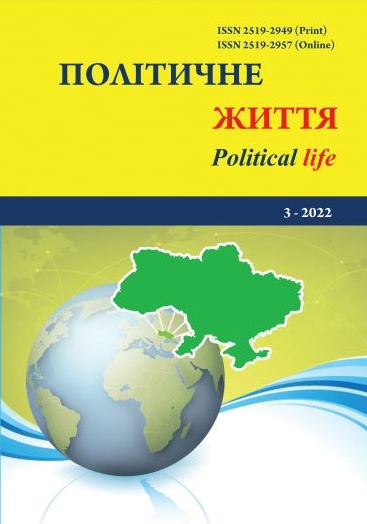The issue of geopolitical allies of Ukraine in the domestic political thought of the first half of the 20th century
DOI:
https://doi.org/10.31558/2519-2949.2022.3.1Keywords:
Ukraine; geopolitics; Ukrainian political thought; geopolitical alliesAbstract
The article is devoted to the analysis of the coverage of the issue of finding geopolitical partners and allies of Ukraine in the geopolitical teachings of Ukrainian thinkers of the first half of the 20th century. The problems of determining foreign policy priorities and Ukraine’s participation in international alliances in recent decades, the search for reliable partners, foremost in the security sphere, are outlined. It is emphasized that the Revolution of Dignity and Russian aggression crystallized the geopolitical priorities of Ukraine – the course for European and Euro-Atlantic integration was returned to the country’s Constitution, and the Russian geopolitical threat became a fact of the collective consciousness of Ukrainian society. It is noted that the theoretical work of Ukrainian political theorists of the first half of the 20th century has not lost its relevance in our time. Furthermore, it is noted that in the interwar period, the Black Sea region was the geographical space that aroused the greatest interest of Ukrainian geopoliticians and which they considered decisive for the future of the Ukrainian state. In their opinion, the fact that Ukraine is historically a part of the Black Sea-Mediterranean communication space, and also ensured the trade relations of this region with the Baltic States, determines the area of search for partners and allies. However, not only countries located in the region are among Ukraine’s potential allies, but also states that have significant geopolitical and economic interests there. The attitude of theorists of Ukrainian geopolitics to the idea of the Baltic-Pontic Federation and the list of countries that can join it is analyzed. The Ukrainian thinkers’ understanding of the peculiarities of the attitude towards the idea of the union of the countries of Eastern Europe and the creation of the Ukrainian national state within its ethnographic boundaries of the main geopolitical subjects of Europe – Great Britain, France, Germany, Italy and Soviet Russia – is revealed. The significance of the interaction of the Ukrainian state with Poland and Romania is emphasized. It is emphasized that the ideas of Ukrainian geopoliticians of the first half of the 20th century have not lost their relevance and require further study and understanding.
References
Стратегічне партнерство без стратегії. Хто вони – стратегічні партнери України? Стратегічне партнерство без стратегії (tilda.ws).
Стратегічне партнерство України. Аналітична записка. Стратегічне партнерство України. Аналітична записка / Національний інститут стратегічних досліджень (niss.gov.ua).
Липинський В. Листи до братів хліборобів про ідею і організацію українського монархізму / ред. Я. Пеленський. Київ Філадельфія 1995. 471 c.
Рудницький С. Чому ми хочемо самостійної України? / Упоряд., передмова О.І.Шаблія. Львів, 1994. 416 с.
Грушевський М. Хто такі українці і чого вони хочуть. К., 1991. 240 с.
Липа Ю. Призначення України. – Нью-Йорк, 1953. 307 с.
Липа Ю. Всеукраїнська трилогія: У 2 т. Т. 2 : Чорноморська доктрина; Чорноморський простір (атлас); Розподіл Росії / Ю. Липа. К., 2007. 392 с. 8. Грушевський М. На порозі нової України. К., 1991. 128 с.
Синявський А. УСРР та Близький Схід у світлі геополітики. Синявський А. Вибрані праці. К., 1993. 384 с.
У перелік стратегічних партнерів України помістили Азербайджан, але не Румунію і Словаччину. URL: https://www.eurointegration.com.ua/news/2020/09/15/7114366/

